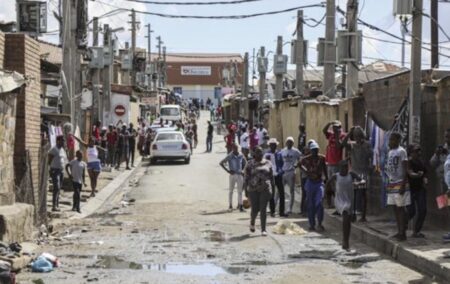“Why should I pay for the services I receive? It is my basic human right to force other people, often poorer than me, to pay for my services.” This seems to be new moral posture of some white and black South Africans. In white Sandton, they feel that other people must pay for their roads. In black Soweto, they feel that other people must pay for their electricity.
Last week, the president’s sister, Ivy Ramaphosa, who lives in Soweto, was told to hide if angry neighbours came knocking on her door, demanding to know why the president was cutting off their illegal electricity. In Soweto and Alexandra, people are refusing to pay for electricity to Eskom and City Power. Instead they pay criminals to make illegal and dangerous connections to steal electricity from these suppliers. Sometimes they even attack technicians from the electricity utilities who try to cut the illegal connections. All of this results in overloading, transformer explosions and other damage to the electricity system, costing Eskom and City Power a fortune, adding to their massive debts from unpaid electricity. Many people in Soweto and Alexandra are wealthy enough to pay for their electricity. They don’t want to. Since their neighbours are not paying, why should they be the suckers who pay? Some of them strike up moral attitudes, as if it is their right to get free electricity. Who do they think should pay for their costs to Eskom and City Power? Other people of course.
Rich white citizens of Sandton have behaved in a somewhat similar way – not altogether similar, I stress – about paying for the magnificent new highways that have been built for them. The proposed way of paying seemed fair and just. The user must pay, and payment must be as easy as possible. The government set up a system of E-Tolling. As a motorist passed under a gantry over one of these new highways, a camera would pick up his licence number, and send an electronic invoice to him. This would avoid the delays and fuss of queuing at a toll plaza. A good system it seemed, but it immediately ran into problems.
OUTA (Organisation Undoing Tax Abuse) came into being to oppose E-Tolling. It said the E-Tolling infrastructure was far too expensive and there had been collusion (corruption) with the winning tenders to supply it. It said that the billing system often made horrible mistakes. I don’t doubt a word of this. It advised Sandton motorists not to pay their E-Toll bills. Most didn’t. When asked how the sparkling new roads which the Sandton elite now enjoy should be paid for, OUTA said through the national fuel levy, the tax on petrol and diesel that is added to your bill at the filling stations. They said this was a simple tax to collect and one that nobody could escape. True. But it is an unfair tax. It means that poor motorists in Limpopo, condemned to crumbling dirt roads, must be forced to subsidise the gleaming new tar roads for rich motorists in Sandton.
Only one of my Joburg friends pays her E-Toll bills. I’ve been with her when she drove under a gantry and heard the little bleep. She tells me her E-Tolling bills are prompt and fair. In her case the system worked well. No doubt for many other people it didn’t. Does this give them the right not to pay? Do they regard her as a sucker for paying for the roads she uses?
A deeper question is taxes and rates. Hardworking South Africans are forced to hand over a large portion of their income as taxes to our ANC rulers, who use the money to pay enormous salaries to their chums and relatives, to buy Mercs and BMWs, private education for their children, five-star accommodation, fancy trips abroad, and Gucci and Louis Vuitton. The taxpayer gets nothing in return except for crumbling services, appalling education and spiraling crime. Should the taxpayers refuse to pay taxes? Should there be a “tax-revolt”? I don’t see how this can be justified. What are the objective criteria for deciding whether tax money is well used? Who is going to rule on it? As far as I can see, we just have to cough up, and then vote for the opposition in the next election or, more likely, emigrate to a country that doesn’t waste our money so much as the ANC.
It is impossible to exaggerate the importance of cost-reflective services. If you charge everybody the real cost of the services they receive, and if you oblige them to pay, they will use them wisely. If you subsidise the services (electricity, water, transport, whatever) they will abuse them, and use more than they need, pushing up the costs and debts to the supplier. Much better to give poor people a social grant so that they can choose to pay market prices for the services they choose.
The user must pay. There is no moral right to make other people pay. And somehow we must try to make our services as efficient and competitive as possible. The “culture of non-payment” is theft.
[Photo: Kayleen Morgan/EWN]

